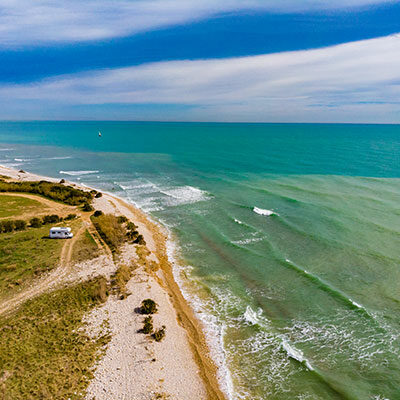
January Sale Now On!
It’s time to start preparing for the new year ahead! So what better way to do that with lots of January special offers coming your way! Read more ›
On a practical level, a small car can physically tow a large caravan, but there are legal restrictions.
As a rule, you will also find it easier to manage your outfit if you stick to certain car to caravan weight ratios. After all, if you are overtaken by an HGV on an exposed road on a windy day, even the most experienced driver will be glad he or she has stuck to a sensible ratio.
It is best to use the heaviest, most powerful car to tow the lightest possible caravan. However, many people consider the running costs of their cars as well as the purchase price, so are moving towards more fuel-efficient engines.
There are four main figures to consider when matching a car to a caravan: the car’s kerbweight, the car’s towing limit, the car’s Gross Train Weight (GTW) and the caravan’s Maximum Technically Permissible Laden Mass (MTPLM). You will find definitions of these further down this page.
We recommend you only tow a caravan that weighs 85 per cent or less of your car’s kerbweight. Legally, if you add together the Maximum Authorised Mass (MAM) of your car and the MTPLM of your caravan, the total weight must not exceed the GTW of the car.
Some of these figures will appear on the weight plates of your car and caravan. The others should be given in the handbook.
In a car, the weight plate is also known as the Vehicle Identification Number (VIN) and is often found under the bonnet or on the driver’s door pillar. A caravan weight plate will probably be close to the entrance door.
The standard MTPLM figure for caravans given by manufacturers is calculated according to the British and European standard BS EN 1645. It is technically known as the MTPLM (Lower Limit) and in some cases this can be increased to the MTPLM (Upper Limit). This Upper Limit is based on the physical limits of the caravan itself, such as its chassis and axle limits. If you have a suitable tow car and your driving licence allows it, you can ask your caravan dealer to ‘re-plate’ the unit to the higher MTPLM with the resulting increase being the amount of luggage and other extras you can carry. It is important to do this because if you are challenged by the police or caravan insurance company and questioned about the legality of your outfit, it is the figures given on the plates and accompanying documentation that will be used to validate your statements.
Some car manufacturers also quote different towing limits for the same car, depending on whether or not it is carrying passengers. It is therefore important to confirm the towing limit of your car in the situation you will be using it in. The limit should be given in your car’s handbook, but you may need to contact the manufacturer if it is unclear.
The difference between the Mass in Running Order (MIRO) and MTPLM of your caravan is known as its User Payload. This may be the weight of the extra things you can carry inside, as it’s likely your circumstances will be different from the carefully specified ones used to calculate the figures.
If your caravan has a leisure battery installed or if you have items fitted to the caravan after it has left the factory, such as a motor mover, the weight of these items will need to come out of your User Payload.
As a general guide, basic items for two people will weigh about 100kg, with an extra 25kg allowance for each additional person. However, if you carry several heavy security devices and an extra gas bottle, for example, it will eat into your payload. It is worth getting a rough idea of how much your luggage and extras will weigh before you load up the caravan. You may find some of the heavier items need to be carried in the car – though be careful not to overload that either.
Another important figure is your caravan’s noseweight. This measures the downwards force put on the car’s towball and it varies depending on how you load the caravan.
To keep your caravan as stable as possible on the road, you will need to load it carefully. Excess weight in the rear of the caravan, for example, can cause the unit to act like a pendulum behind the car, causing it to be unstable or ‘snake’. This can be uncomfortable and is potentially dangerous if it gets out of control.
When it is ready for the road, the caravan’s noseweight should be as heavy as possible, but not exceed the car’s towball limit or the caravan’s own noseweight. Both are normally between 50kg and 100kg.
You can buy a noseweight gauge to check your unit’s true noseweight before each trip or use a piece of wood along with a set of bathroom scales to do the same job.
Understanding the weight limits of your caravan is the first step to safe loading, and is critical to the safety of you, your family, and other road users. The way you actually load your caravan is also important, as it will give your caravan stability, helping to prevent accidents.
When loading, the key is to evenly distribute weight. Make sure that heavy items are placed over the axle, to prevent them snacking at the back of the caravan. You should also keep heavy items on the floor of the caravan, so that the centre of gravity stays lower, reducing the risk of toppling over. And if you are carrying gas cylinders, they will need to be stored upright, and securely held.
Before you change your car or caravan, here is a checklist to clarify whether you have achieved a good match. If you can follow these questions and answer ‘yes’ throughout you have achieved a good match between you, your car and caravan.
The questions assume the caravan is braked. Very small caravans with an MTPLM of 750kg or less can be unbraked and come under slightly different regulations.

It’s time to start preparing for the new year ahead! So what better way to do that with lots of January special offers coming your way! Read more ›

With Easter just around the corner it’s time to start preparing for the new season! After a long, cold winter, we’re all looking forward to a spring and summer dotted with trips away in our lei... Read more ›
We will look after your caravan or motorhome just as much as you do. Protect your investment today by booking a service with our workshop staff.
Book for a service ›Looking to sell? Need a quote for insurance purposes? Interested in a part-exchange? We can help, so contact us today.
Book a valuation ›Get in touch with Winchester Caravans & Motorhomes today.
Ask a question ›